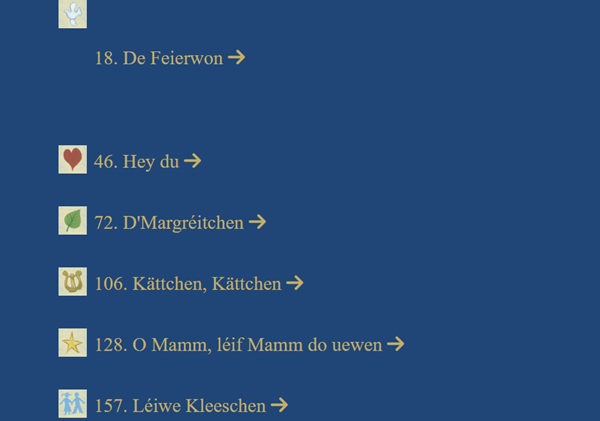
The first edition of the EU Songbook was recently published and includes six Luxembourgish songs in the collection.
The EU Songbook is a collaboration between all EU Member States and celebrates European cultures across the continent, with six songs per country chosen by 87,000 citizens of the 27 Member States and in 25 original languages.
All 164 song titles are available on an app, which is a companion for the physical EU Songbook. The app provides information on each country and the theme of each song chosen, with links to YouTube videos featuring the songs. Information on the author and composer of each song is included, as well as a short history of the song itself, and when it was first published.
Songs are divided into six categories or themes (Freedom & Peace; Love Songs; Nature & Seasons; Folk Songs & Traditionals; Faith & Spirituality and Children's Songs).
The six Luxembourgish songs included are:
- "De Feierwon", ("The Fire-Wagon"; Freedom & Peace), by Michel Lentz. Michel Lentz (1820-93) wrote what has become one of the two ʻunofficialʼ national anthems of Luxembourg. The first railroads were built at a time when Luxembourg was suffering from a lack of transport infrastructure and industry, resulting in 35% of the population emigrating. The country became more accessible following the building of the railways and people took pride in the resulting progress, as is perfectly expressed by Lentz: "Wherever you come from, we can now proudly show you the beauties of this small land", and added "We want to remain as we are, and happily so!"
- "Hey du", ("Hey you"; Love Songs), by Romain Bernard & Cool Feet. "Hey du" is described as a cherished love-song by Luxembourg's rock band, Cool Feet, founded in 1968. They originally sang in English, but since 1980 they have solely published music with Luxembourgish lyrics. This song was a chart topper in the 1980s.
- "D'Margréitchen", ("The Daisy"; Nature & Seasons), by Michel Lentz. This song's music was composed by Laurent Menager (1835–1902), a choirmaster, organist and conductor who founded the national choral association Sang a Klang in 1857. It is based on a poem by Michel Lentz (1820-93), the man behind the lyrics to Luxembourg's national anthem. First published in 1883, at a time when most families barely had enough to eat, this song praises the beauty of the most common of flowers, the daisy.
- "Kättchen, Kättchen", ("Kitten, kitten"; Folk Songs & Traditionals), by Willy Goergen. These lyrics by Willy Goergen (1867-1942) praise the virtues and qualities of Luxembourgʼs Moselle wines. One hundred years later, the song is still played at practically every wine festival and harvest celebration in the country.
- "O Mamm, léif Mamm do uewen", ("O Mother, Up Above Us"; Faith & Spirituality), by Charles Müllendorff. This was originally a poem before becoming a song called "Ons Himmelsmamm" (Our Heavenly Mother), dedicated to the Virgin Mary, the patron saint of the Grand-Duchy of Luxembourg, at the end of the 19th century. It is sung as the closing hymn at every church service dedicated to Our Lady in Luxembourg, and has also been sung as an expression of patriotism at times when the country's independence was at stake.
- "Léiwe Kleeschen", ("Dear Saint Nicolas"; Children's Songs), by Willy Goergen. The poem by Willy Goergen (1867-1942) was dedicated to the children's patron Saint Nicolas, the Luxembourgish version of Santa Claus. The melody was created by twelve-year old Pëppy Beicht (1907-76), born into a family of musicians and composers. It is probably the best known and most sung Luxembourgish song of all times.
Each song is presented with lyrics in both the 25 original languages (spanning three alphabets) and in singable European English. QR-codes on all scores lead to original recordings, and a mosaic of introductions, crafted by 61 national editors, provides unique access to European (music) history through the centuries.
The EU Songbook is intended for all song lovers in the EU, and around the world, to be sung at any occasion, including Europe Day, 9 May, dedicated to celebrating peace and unity in Europe.


